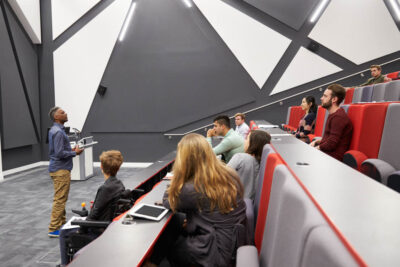- All Blog Categories
- Adult Education Blog
- Advancement Blog
- Community College Blog
- Data & Analytics Blog
- Enrollment Blog
- Higher Education Strategy Blog
- K-12 District Leadership Blog
- Student Success Blog
Our Blogs
Get the latest insights from EAB experts on a variety of topics and terrains from enrollment to student success to K-12 education to higher education strategy and beyond.

Five areas enrollment leaders are prioritizing in 2026

3 headwinds shaping graduate and adult enrollment in 2026

What higher ed can learn from these successful academic program revitalizations

What are students asking university chatbots?
EAB Blogs by the Numbers
100+
Blogs authored last year8
Different blogs that span topics in education53
Contributing expertsRecent and Featured Posts from Every Blog
-
Student Success Blog
Student success as a revenue strategy in higher education
Learn how student success protects higher education revenue. From summer melt prevention to stop-out re-enrollment, see 4 ways students success drives financial success.
Blog -
K-12 District Leadership Blog
What it takes to be a high-performance district
Learn about EAB's High-Performance District Award, the eight pillars of a high-performing district, and why we honored Huntley Community School District 158 as the inaugural winner.
Blog -
Advancement Blog
How to deepen donor connections in a more cautious giving climate
Learn how advancement teams can build stronger donor relationships, boost retention, and frame giving as mission-driven investment.
Blog -
Enrollment Blog
15 more campus visit tweaks that win over students
15 practical strategies to elevate your campus tour experience—from pre-visit texting to awe moments and guide training that drive yield.
Blog -
K-12 District Leadership Blog
3 overlooked reasons K-12 students don’t seem ready for life after high school
Uncover three emerging barriers that help explain why student postsecondary readiness continues to erode.
Blog -
K-12 District Leadership Blog
Early lessons from district leaders navigating a more volatile budget environment
We've outlined three early insights on K-12 financial and operational stability based on our research conversations with 40+ district leaders.
Blog -
Enrollment Blog
What Blockbuster can teach enrollment leaders about AI-powered college search
How will AI reshape college search? Explore four future scenarios and key actions enrollment leaders should take now.
Blog -
Adult Education Blog
The big bets that actually drive online enrollment growth
Learn how colleges can grow online enrollment sustainably—by achieving product-market fit, overcoming growth plateaus, and scaling with intention.
Blog -
Student Success Blog
Career readiness can’t wait until junior year
Career exploration can’t wait. Learn how first-year programs can build early career readiness through low-risk experiences and applied learning.
Blog
Great to see you today! What can I do for you?